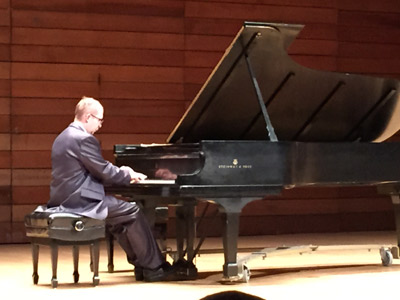On Friday night, October 17, a packed audience went to see the opening concert of the Tutunov Piano Series at the Music Recital Hall at Ashland’s Southern Oregon University. They purchased tickets in advance, expecting to see a concert by Grammy winning, often recorded (25 compact discs to date), internationally renowned piano soloist, recitalist and piano teacher, Joseph Banowetz. What they saw instead was something much more, quite special, extraordinary, and unplanned.
Upon arriving at the hall, patrons were informed that the 78 year old Mr. Banowetz had suddenly taken ill, would not be able to perform at the concert and would be replaced by Alexander Tutunov and friends – an announcement that proved to be only partly true, as Mr. Banowetz appeared moments later, took the stage and flawlessly played from memory the first three numbers on the program (Bach’s Organ Prelude in G Minor transcribed for piano, Beethoven’s 32 Variations in C Minor, and Schubert’s Allegretto in C Minor). Banowetz, who is a giant of long standing among international piano soloists and recitalists, having performed in over 35 countries in a career spanning over 40 years, had the audience enthralled, with his nuanced, sure and inspiring playing of the three challenging, impressive pieces by classical masters, and met with thunderous applause and standing ovations after each of them. But after the third piece, he arose from the piano bench clearly looking more than a tad bit indisposed, took a bow, and exited the stage.
One more piece was listed on the program prior to intermission, Schubert’s Sonata in A Minor. Out onto the stage stepped Alexander Tutunov, an internationally acclaimed touring piano soloist and recitalist in his own right, who it just happens was trained as a student of Mr. Banowetz (which explains how the giant made a place on his busy international touring schedule to perform in Ashland for the Tutunov Piano Series). Mr. Tutunov, who had not prepared to perform in this concert and had not prepared to perform Schubert’s Sonata in A Minor, nevertheless substituted for Mr. Banowetz. Sight reading the piece with the help of his own consummate former piano student, Jodi French, as page turner, Mr. Tutunov produced an admirable performance of Schubert’s Sonata in A Minor under the most challenging of conditions. Again thunderous applause and a standing ovation by an appreciative audience.
After intermission, Mr. Tutunov took the stage, with microphone in hand, and informed the audience what was already obvious, that Mr. Banowetz was too ill to continue. Mr. Tutunov continued, in what is coming to be recognized as his entertaining, amusing, and dryly humorous stage presence: “Well, we have several alternatives, one of which is for me to immediately run off the stage, never to return.” Instead, Mr. Tutunov explained to the audience, the second half of the concert would consist of performances by himself and his students (i.e. the 3rd generation of piano progeny springing from Mr. Banowetz): Nicholas Temple, Tatsiana Asheichyk, and Jodi French.
Mr. Temple, a junior at Southern Oregon University, majoring in piano performance, was up first. He rendered a very impressive performance of Liszt’s extremely technically difficult Transcendental Études. Bearing in mind that Mr. Temple had not been expecting to perform in this concert and had not been preparing for it, this was quite an extraordinary feat. His performance was SO good, one would have thought he has spent a lifetime preparing for it (which he probably has!).
Next up was Ms. Asheichyk, a Russian émigré who graduated Summa Cum Laude from the School of Music in Minsk, Belarus, from the Brest State College of Music and from Southern Oregon University, where she is continuing her studies, getting her Masters degree in Performing Arts studying piano performance under Mr. Tutunov and mastering the organ under Dr. Margaret Evans. Ms. Asheichyk, who appeared on stage as a stunning Slavic beauty in a gorgeous formal gown, offered up an equally beautiful rendition of Chopin’s popular and frequently performed Fantaisie-Impromptu in C-sharp minor. The piece uses many cross-rhythms (the right hand plays sixteenth notes against the left hand playing triplets) and a ceaselessly moving note figuration and is in cut time (2/2). It may be popular, but it isn’t exactly easy. Yet Ms. Asheichyk, who again did not have an opportunity to prepare for this concert, made it seem so, playing it confidently, gracefully, and impressively.
She was followed on the stage by Ms. French, who switched roles with her former teacher, Mr. Tutunov, who now served as page turner for her. Ms. French, again without advanced preparation for this concert, sight read a performance of Handel’s Variations and Fugue on a Theme, more commonly known as the Handel Variations. The piece consists of a set of twenty-five variations and a concluding fugue, all based on a theme from Handel’s Harpsichord Suite No. 1 in B-flat major. The Handel Variations have been described as among “the half-dozen greatest sets of variations ever written” and “a masterful unfolding of ideas concluding with an exuberant fugue with a finish designed to bring down the house”, which it did following Ms. French’s masterful performance.
Finally, last to the stage was the return of Mr. Tutunov, who concluded the concert by performing several pieces from memory. The last piece, prior to the encores, was a passionate and memorable performance of Franz Liszt’s Hungarian Rhapsody No. 3, which had been listed to be performed by Mr. Banowetz during the second half of this concert. It wouldn’t be surprising to discover Mr. Tutunov might have studied the piece long ago under Mr. Banowetz, and Mr. Tutunov’s striking performance of the piece to conclude the program was an emphatic reminder that everything seen and heard at this concert owes its lineage to Mr. Banowetz.
It is unfortunate that Mr. Banowetz was unable to complete this concert as planned, and particularly that the audience did not get to hear him perform Anton Rubinstein’s Deuxieme Akrostychon as scheduled after intermission, as Mr. Banowetz is generally acknowledged to be the foremost contemporary interpreter of Rubinstein’s work (invite him back Sasha!). But what this concert turned out to be, due to the intervention of fate and circumstance, was so much more meaningful and profound than what was originally scheduled. This concert, as it actually unfolded, demonstrated to all, including presumably to Mr. Banowetz, that his contributions to the world of the concert piano will extend long after he himself passes, in his legacy of superbly trained students, and their students, and so on. This concert provided an unexpected, spontaneous glimpse into the immortality of Mr. Banowetz and for that the audience gratefully got more than it ever expected or bargained for.
There are four remaining concerts scheduled in the Tutunov Piano Series:
- On Friday, Nov. 14 at 7:30 pm, Francesco Nicolosi performs a dazzling program of music by Scarlatti, Mozart, and Liszt, along with a very rarely heard piece by Chopin’s friend and rival, Sigismund Thalberg. Nicolosi has toured throughout Europe, Russia, the United States, South America, Japan and China, and appeared in major concert halls including Queen Elizabeth Hall at London’s Wigmore Hall, the Victoria Hall in Geneva, the Salle Gaveau in Paris, the Opera House and the Academy of Santa Cecilia in Rome and the Brahmssaal of Vienna.
- On Friday, Feb. 6 at 7:30 pm, a special Valentine’s piano duo of works by Chopin, Schumann, Liszt, Debussy, Junkinsmith and Milhaud will be performed by Ivona Kaminska and Christopher Bowlby. “This Romantic program will be sure to please everyone in attendance for this early Valentine Day’s celebration,” said Tutunov. “Ivona and Christopher are my favorite piano duo who will impress the audience with their superb balance of musicality and technical brilliance in this beautifully constructed program.” Bowlby is the program director at the Chopin Academy of Music in Issaquah, Wash., and the director and vice president of the Seattle International Piano Festival and Competition. Kaminska teaches at the Chopin Academy of Music and is president of the Seattle International Piano Festival and Competition. Both artists maintain a busy concert schedule as soloists and chamber musicians.
- On Friday, May 1 at 7:30 p.m., Antonio Di Cristofano performs Chopin, Liszt, Berg and Scriabin. Tutunov describes DiCristofano as “the foremost Italian expert in music by a Russian composer — Alexander Scriabin — who will leave everyone breathless with his grand interpretations of a great blend of familiar and rarely performed music.” Di Cristofano’s career has taken him to music halls in Europe, the United States, Brazil, Mexico, Russia, South Korea and Canada.
- On Friday, May 22 at 7:30 p.m., the series wraps up with a grand finale by Dr. Tutunov and friends playing Schubert and Rachmaninoff.
All concerts are held in the SOU Music Recital Hall. The Performing Arts Box Office is located in the Music Recital Hall lobby. Box office hours are noon to 6 p.m. Monday through Friday and two hours prior to each performance. Tickets can be purchased with a credit card over the phone by calling 541-552-6348 or online at sou.edu/performingarts.[/fusion_builder_column][/fusion_builder_row][/fusion_builder_container]


 Lee Greene was born & raised in a NJ family where the only religion worshipped was classical music, Leonard Bernstein was God, and the radio was constantly on and tuned to classical station WQXR (which is now always on in his Jacksonville home thanks to the miracle of the Internet). Growing up in the New York City metropolitan area and later while residing and practicing law in NYC, Lee attended oodles of Broadway and off-Broadway theater productions, as well as concerts and opera at Lincoln Center, Carnegie Hall and other NYC venues. Lee is now a retired attorney, runs a computer support business, and has served on the boards of Rogue Opera & Siskiyou Violins. Lee also writes Performing Arts reviews published on the website,
Lee Greene was born & raised in a NJ family where the only religion worshipped was classical music, Leonard Bernstein was God, and the radio was constantly on and tuned to classical station WQXR (which is now always on in his Jacksonville home thanks to the miracle of the Internet). Growing up in the New York City metropolitan area and later while residing and practicing law in NYC, Lee attended oodles of Broadway and off-Broadway theater productions, as well as concerts and opera at Lincoln Center, Carnegie Hall and other NYC venues. Lee is now a retired attorney, runs a computer support business, and has served on the boards of Rogue Opera & Siskiyou Violins. Lee also writes Performing Arts reviews published on the website,